【2015中考复习方案】(冀教版·河北)2015届九年级英语复习课件(自学反馈+重点突破):第1课时 Units 1—4 [七年级上册](共38张PPT)
文档属性
| 名称 | 【2015中考复习方案】(冀教版·河北)2015届九年级英语复习课件(自学反馈+重点突破):第1课时 Units 1—4 [七年级上册](共38张PPT) | 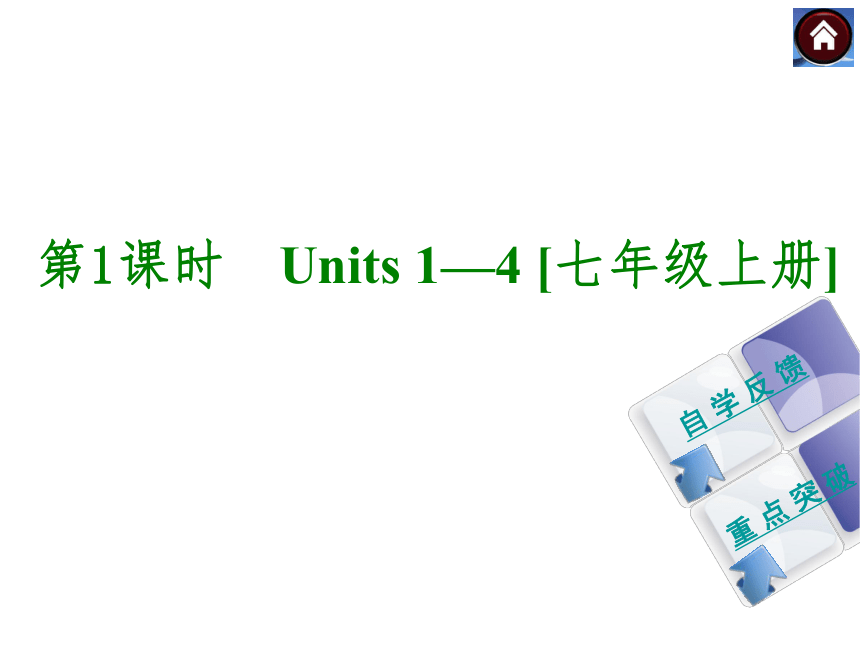 | |
| 格式 | zip | ||
| 文件大小 | 477.7KB | ||
| 资源类型 | 教案 | ||
| 版本资源 | 冀教版 | ||
| 科目 | 英语 | ||
| 更新时间 | 2015-01-17 17:51:23 | ||
图片预览

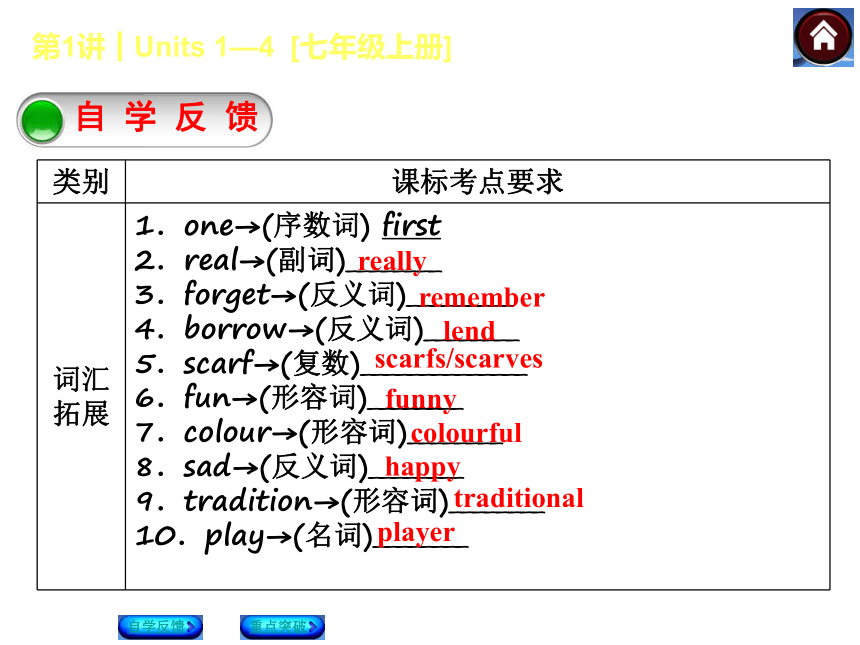
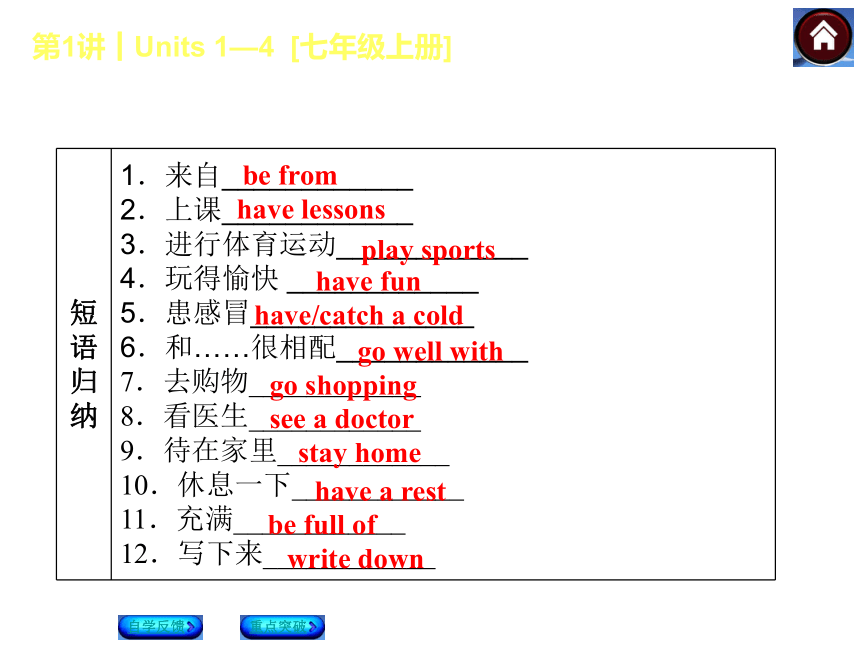
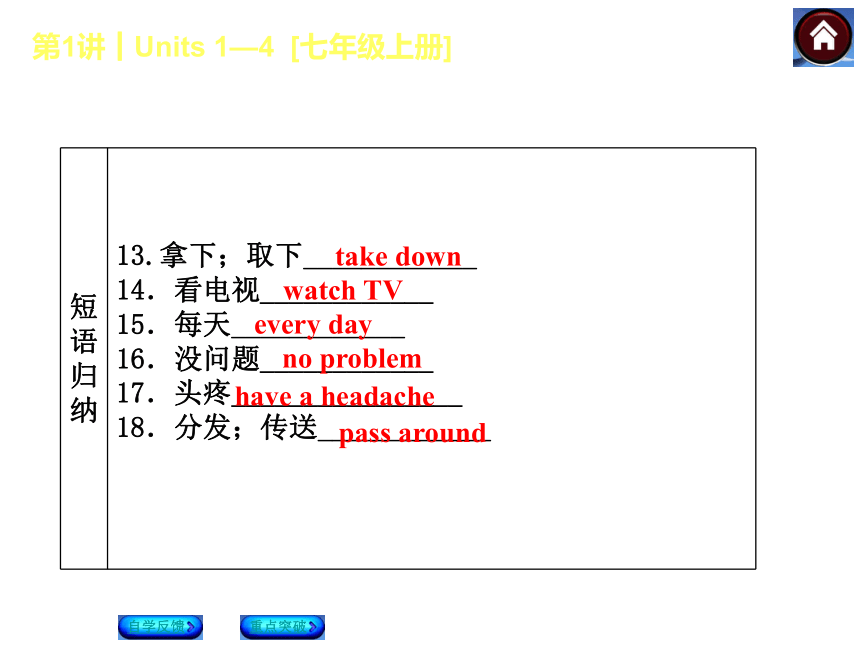
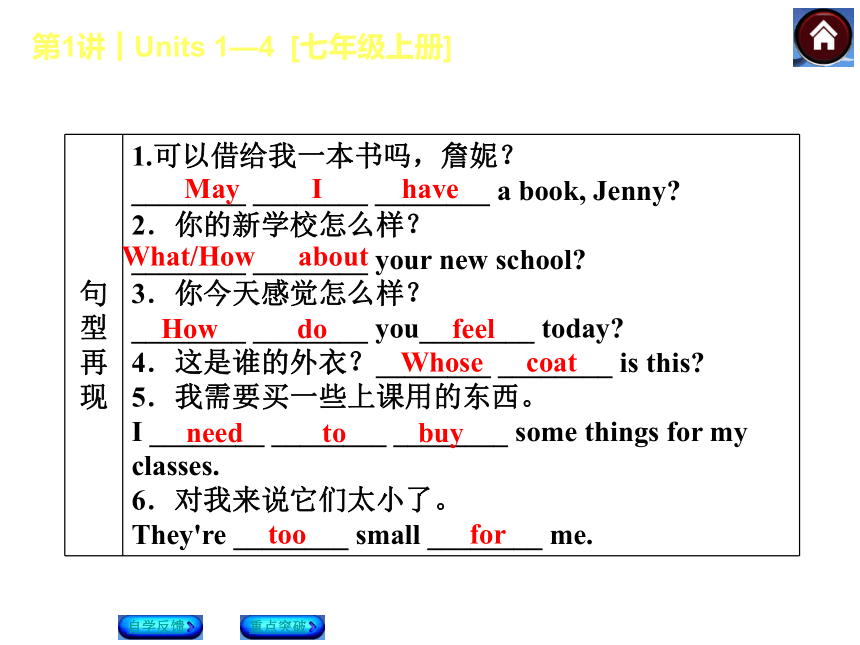
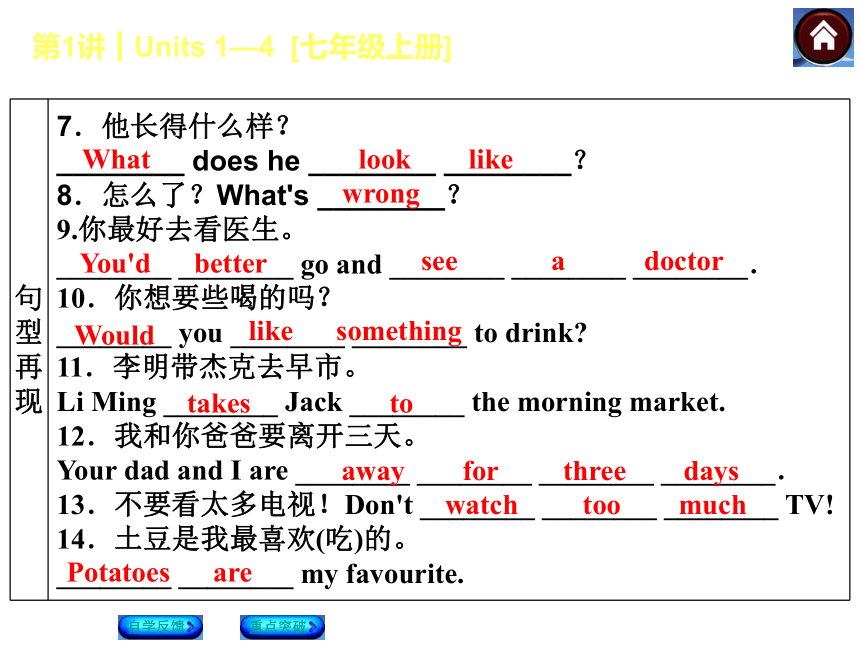
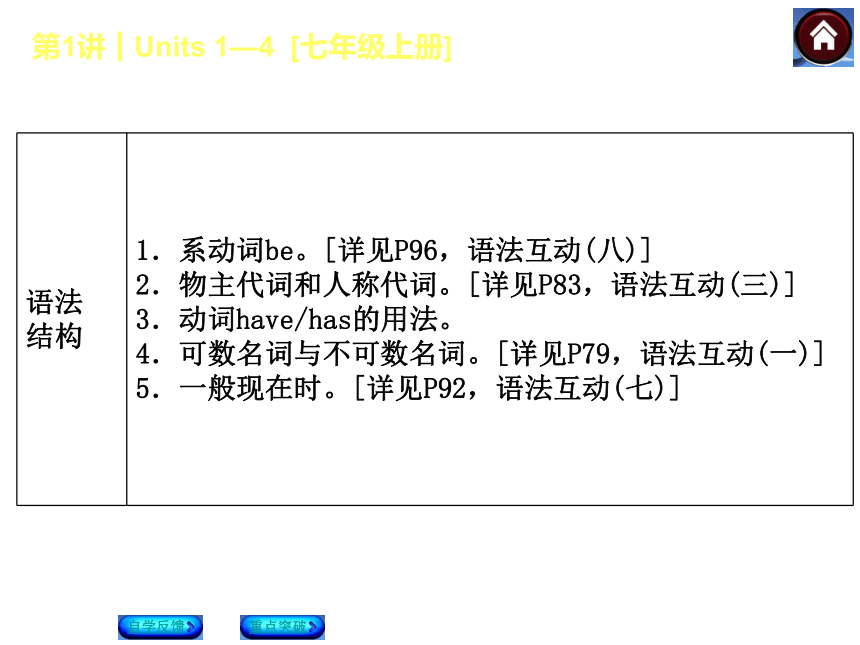
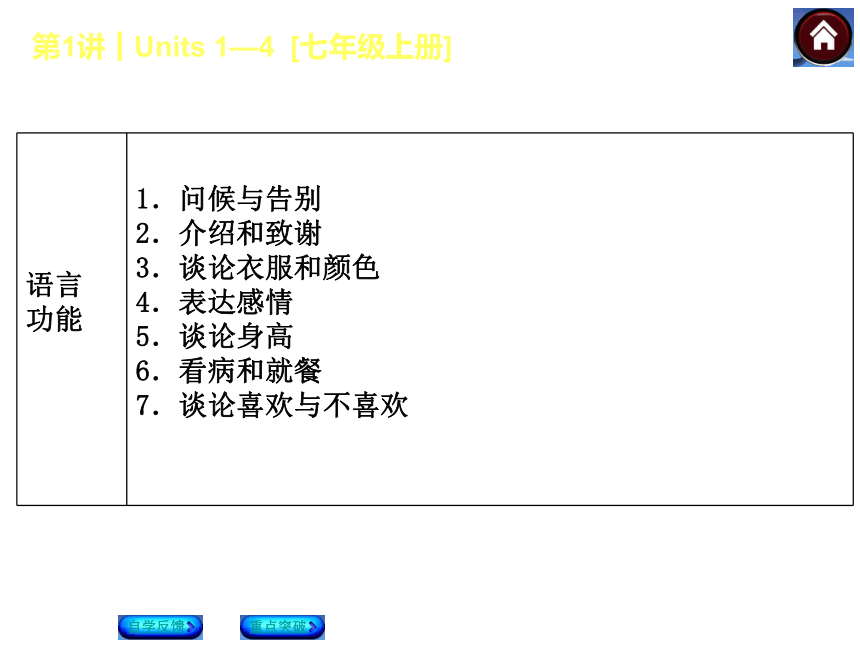
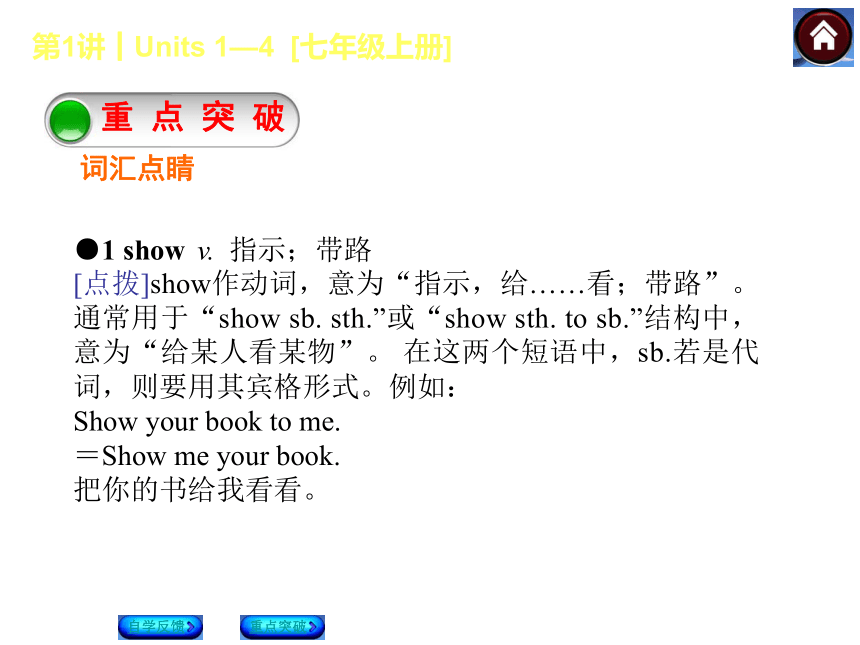
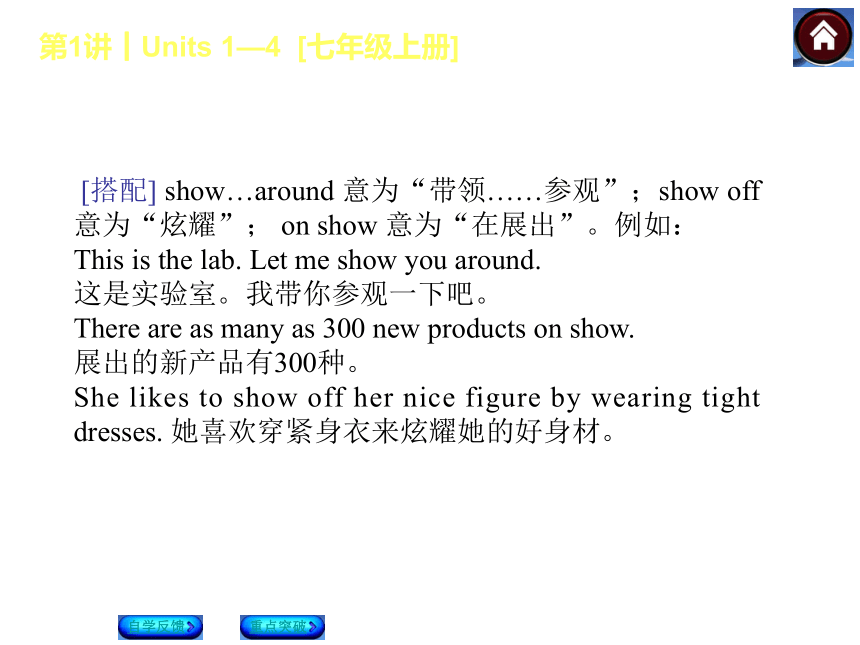
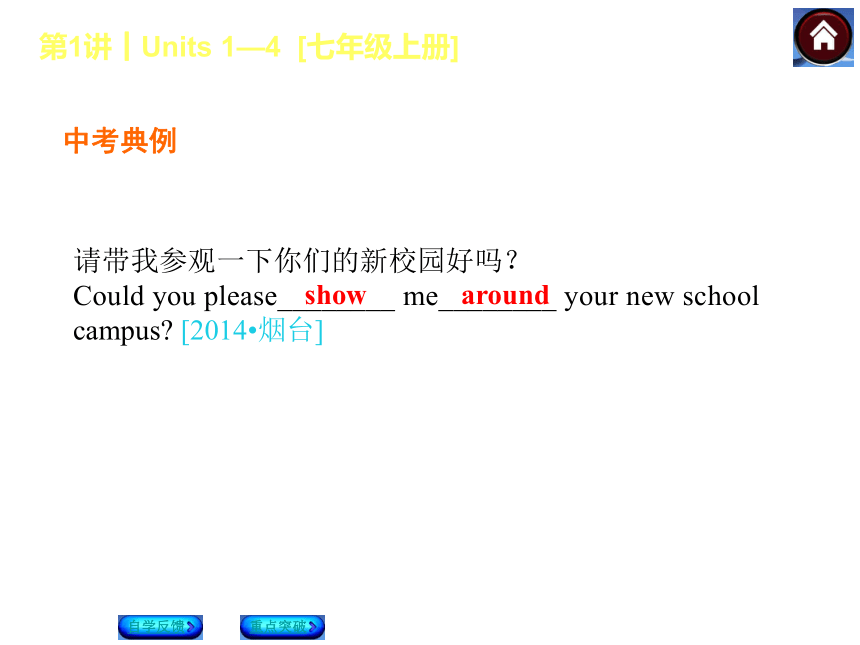
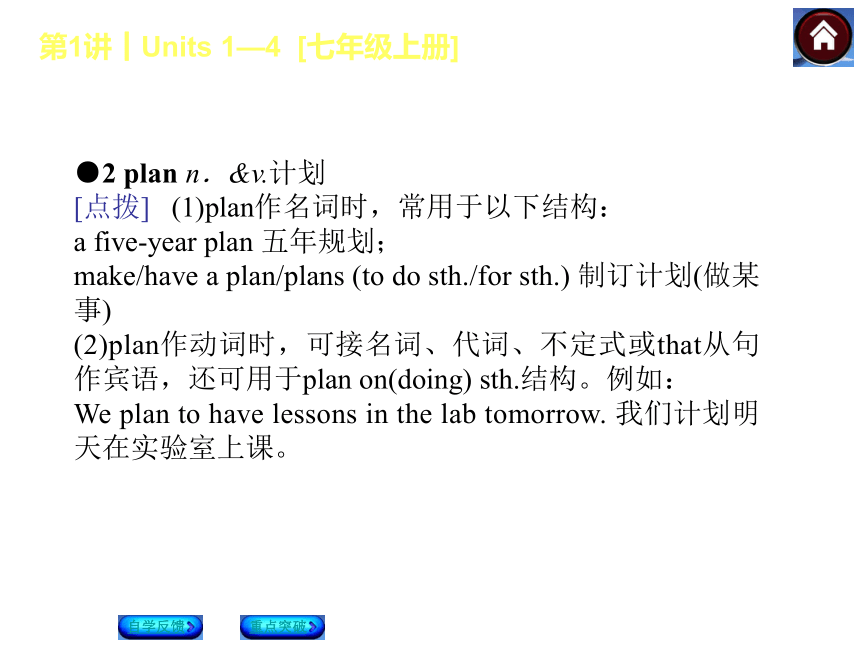
文档简介
课件38张PPT。第1课时 Units 1—4 [七年级上册]自 学 反 馈重 点 突 破第1讲┃Units 1—4 [七年级上册] rememberlendscarfs/scarveshappyreallycolourfulfunnytraditionalplayer第1讲┃Units 1—4 [七年级上册]be fromhave lessonsplay sportshave funhave/catch a coldgo well withgo shoppingsee a doctorstay homehave a restbe full ofwrite down第1讲┃Units 1—4 [七年级上册]take downwatch TVevery dayno problemhave a headachepass around第1讲┃Units 1—4 [七年级上册]May I haveneed to buyWhat/How aboutHow doWhose coatfeeltoofor第1讲┃Units 1—4 [七年级上册]Whatsee a doctorwrongwatch too muchYou'd bettertakes toWouldaway for three dayslook likelike somethingPotatoes are第1讲┃Units 1—4 [七年级上册]第1讲┃Units 1—4 [七年级上册]第1讲┃Units 1—4 [七年级上册]词汇点睛●1 show v. 指示;带路
[点拨]show作动词,意为“指示,给……看;带路”。通常用于“show sb. sth.”或“show sth. to sb.”结构中,意为“给某人看某物”。 在这两个短语中,sb.若是代词,则要用其宾格形式。例如:
Show your book to me.
=Show me your book.
把你的书给我看看。
第1讲┃Units 1—4 [七年级上册] [搭配] show…around 意为“带领……参观”;show off意为“炫耀”; on show 意为“在展出”。例如:
This is the lab. Let me show you around.
这是实验室。我带你参观一下吧。
There are as many as 300 new products on show.
展出的新产品有300种。
She likes to show off her nice figure by wearing tight dresses. 她喜欢穿紧身衣来炫耀她的好身材。
第1讲┃Units 1—4 [七年级上册]请带我参观一下你们的新校园好吗?
Could you please________ me________ your new school campus? [2014?烟台]
中考典例showaround
第1讲┃Units 1—4 [七年级上册]●2 plan n.&v.计划
[点拨] (1)plan作名词时,常用于以下结构:
a five-year plan 五年规划;
make/have a plan/plans (to do sth./for sth.) 制订计划(做某事)
(2)plan作动词时,可接名词、代词、不定式或that从句作宾语,还可用于plan on(doing) sth.结构。例如:
We plan to have lessons in the lab tomorrow. 我们计划明天在实验室上课。
第1讲┃Units 1—4 [七年级上册]—The picnic is only in three days. Have you made any ________?
—Not yet. So let's discuss what to prepare. [2014?台州]
A.wishes B.plans
C.mistakes D.friends
中考典例B
第1讲┃Units 1—4 [七年级上册]●3 ready adj. 准备好的
[点拨] ready为形容词,意为“准备好的”。ready不可置于名词前作定语,常放在be动词之后作表语。例如:
The students are ready to have classes.
同学们准备好上课了。
[拓展] ready的相关固定搭配:
(1)be ready for意为“准备好”。例如:
Everything is ready for the party.
有关聚会的一切都准备好了。
(2)be ready to do sth.意为“已准备好做某事”。例如:
I'm not ready to leave yet.我还没准备好要离开。
第1讲┃Units 1—4 [七年级上册]●4 forget v. 忘记
[点拨] forget 为及物动词,意为“忘记”。forget常用于两种结构中:forget to do sth.与forget doing sth. 第1讲┃Units 1—4 [七年级上册]—A storm is on the way. Don't forget ________ the window when you go to sleep, Mike.
—I won't, Mum. [2014·广元]
A.close B.closing C.to close中考典例C[拓展] forget的反义词为remember,其用法与forget相似:
remember to do sth.记着要做某事;
remember doing sth. 记得做过某事
第1讲┃Units 1—4 [七年级上册]●5 a pair of 一双……;一对……
[点拨] a pair of后面接可数名词的复数形式,主要用于表达成双成对或者由两部分构成的物品的数量;表示“几对,几副,几双”时,要用“基数词+pair(s) of…”结构。
[拓展] “a pair/kind/type of+复数可数名词”作主语时,谓语动词用单数形式;当“pairs/kinds/types of+复数可数名词”作主语时,谓语动词用复数形式。例如:
A pair of sunglasses is lying on the table.
桌上有一副太阳镜。
There are two pairs of shoes under the bed.
床下有两双鞋。 第1讲┃Units 1—4 [七年级上册]●1 above, over, on巧辩异同
第1讲┃Units 1—4 [七年级上册]
●2 forget, leave
forget和 leave两个词都有“遗留,丢失”的意思,但用法和具体含义不同。
(1)forget后只能跟被遗忘的东西,不能跟地点。例如:
My father forgot his wallet and went back for it.
我爸爸忘了他的钱包,他回去把它取回来了。
(2)leave表示“遗留、丢失”时,其后跟地点。 例如:
I left my homework at home,so I couldn't hand it in on time.
我把作业落在家里了,因此不能按时上交。第1讲┃Units 1—4 [七年级上册]—May I have a look at your plan for the robot competition,Smith?
—Sorry,Mrs. Brown. I've________ it at home. [2014·绵阳]
A.missed B.forgotten C.left D.lost中考典例C
第1讲┃Units 1—4 [七年级上册]●3 and, or, but, so
第1讲┃Units 1—4 [七年级上册]
第1讲┃Units 1—4 [七年级上册]Let's wait ________ see how the two countries will deal with the problems. [2013?资阳]
A.so B.or C.but D.and
中考典例D
第1讲┃Units 1—4 [七年级上册]●4 in, on, at
三者都是介词,但在表示时间时是有区别的。
第1讲┃Units 1—4 [七年级上册]—When were you born?
—I was born________a cold winter morning in 1994. [2014·南充]
A.in B.at C.on D.of 中考典例C第1讲┃Units 1—4 [七年级上册]●1 May I have a book, Jenny?
可以借给我一本书吗,詹妮?
[点拨] 该句是一般疑问句,其结构为“May I+动词原形+其他?”在一般疑问句中,情态动词应放在主语的前面,这种句型通常表示一种委婉的请求。表示答应/允许别人的请求时,口语中常用“Sure(可以).”来回答,也可以用“Yes, you may.”礼貌的否定回答应为“I'm sorry.”或“I'm afraid you can't.”can也是情态动词,是“可以,能够”的意思。例如:
—May I have a chair?我可以要一把椅子吗?
—I'm afraid you can't.恐怕不行。句型透视第1讲┃Units 1—4 [七年级上册]—Mum,may I play football with my classmates after school?
—________ [2014?德州]
A.I can't wait to see her.
B.I don't feel alone any more.
C.You'd better come back home earlier.
D.Great!Let's do it.
中考典例C第1讲┃Units 1—4 [七年级上册]
第1讲┃Units 1—4 [七年级上册]
●2 You'd better go and see a doctor, Wang Mei. 王梅,你最好去看医生。
[点拨] You'd better…意为“你最好……”,是表示委婉劝告的常用句型,后接动词原形。变否定句时,在better后加not,即:You'd better not…,表示“你最好别……”。例如:
You'd better not go out.It's so dark outside.
你最好别出去,外面很黑。
注意:'d better 中的'd是had的缩写。此结构没有人称和数的变化。第1讲┃Units 1—4 [七年级上册]你最好买一本英语词典。 [2013?北京]
____________ buy an English dictionary.
中考典例You'd better
第1讲┃Units 1—4 [七年级上册]●3 What would you like?/Would you like something to drink? 你想要点什么?/你想要些喝的吗?
[点拨] 句中的would like意为“想要”,相当于want,但比want语气更客气委婉。would like可缩写成“'d like”,可用于所有人称。例如:
He'd like some soup.=He would like some soup.他想喝点汤。
第1讲┃Units 1—4 [七年级上册]
[拓展] would like的常见用法:
(1)“would like+名词或代词”表示“想要”。
(2)“would like+to do sth.”意为 “想要做某事”。例如:
Would you like to have a rest?你想休息一下吗?
(3)“would like+sb.+to do sth.”意为“想让某人做某事”。例如:
I would like you to have supper with us.
我想让你和我们一起吃晚饭。
[注意] “Would you like some…?” 用于寻求对方的意向或建议,并希望得到肯定回答。其肯定回答常用 “Yes, please.”,否定回答则用 “No, thanks/thank you.”
第1讲┃Units 1—4 [七年级上册]—Would you like something to drink?
—________. I'm thirsty. [2014?重庆]
A.Yes, I can B.No, thanks
C.Yes, please D.No, I don't like it
中考典例C第1讲┃Units 1—4 [七年级上册]1. My friend showed ________ some old photos of his family. [2014?聊城]
A.my B.I C.me D.mine
C第1讲┃Units 1—4 [七年级上册]2.Please remember ________ your notebook here tomorrow. [2014?泸州]
A.brings B.brought
C.bringing D.to bring
D第1讲┃Units 1—4 [七年级上册]3.Some workers in that factory have to work ________ night. [2014?嘉兴]
A.at B.for
C.with D.among
4.—Write down your uncle's e-mail address, ________ you'll forget it.
—All right, Mum.
A.and B.but C.so D.or
AD第1讲┃Units 1—4 [七年级上册]5.Last week I met my old friend Li Ming, but I forgot ________ him for his telephone number.
A.to ask B.ask
C.asking D.asked
A第1讲┃Units 1—4 [七年级上册]6.This pair of shoes ________ me well, but the shoes are expensive. [2014?巴中改编]
A.fit B.fits
C.fitted D.is fitted
7.The temperature will be ________ zero.
A.under B.on
C.over D.above
8.We are ready ________ an English exam.
A.have B.has
C.to have D.had
BDC
[点拨]show作动词,意为“指示,给……看;带路”。通常用于“show sb. sth.”或“show sth. to sb.”结构中,意为“给某人看某物”。 在这两个短语中,sb.若是代词,则要用其宾格形式。例如:
Show your book to me.
=Show me your book.
把你的书给我看看。
第1讲┃Units 1—4 [七年级上册] [搭配] show…around 意为“带领……参观”;show off意为“炫耀”; on show 意为“在展出”。例如:
This is the lab. Let me show you around.
这是实验室。我带你参观一下吧。
There are as many as 300 new products on show.
展出的新产品有300种。
She likes to show off her nice figure by wearing tight dresses. 她喜欢穿紧身衣来炫耀她的好身材。
第1讲┃Units 1—4 [七年级上册]请带我参观一下你们的新校园好吗?
Could you please________ me________ your new school campus? [2014?烟台]
中考典例showaround
第1讲┃Units 1—4 [七年级上册]●2 plan n.&v.计划
[点拨] (1)plan作名词时,常用于以下结构:
a five-year plan 五年规划;
make/have a plan/plans (to do sth./for sth.) 制订计划(做某事)
(2)plan作动词时,可接名词、代词、不定式或that从句作宾语,还可用于plan on(doing) sth.结构。例如:
We plan to have lessons in the lab tomorrow. 我们计划明天在实验室上课。
第1讲┃Units 1—4 [七年级上册]—The picnic is only in three days. Have you made any ________?
—Not yet. So let's discuss what to prepare. [2014?台州]
A.wishes B.plans
C.mistakes D.friends
中考典例B
第1讲┃Units 1—4 [七年级上册]●3 ready adj. 准备好的
[点拨] ready为形容词,意为“准备好的”。ready不可置于名词前作定语,常放在be动词之后作表语。例如:
The students are ready to have classes.
同学们准备好上课了。
[拓展] ready的相关固定搭配:
(1)be ready for意为“准备好”。例如:
Everything is ready for the party.
有关聚会的一切都准备好了。
(2)be ready to do sth.意为“已准备好做某事”。例如:
I'm not ready to leave yet.我还没准备好要离开。
第1讲┃Units 1—4 [七年级上册]●4 forget v. 忘记
[点拨] forget 为及物动词,意为“忘记”。forget常用于两种结构中:forget to do sth.与forget doing sth. 第1讲┃Units 1—4 [七年级上册]—A storm is on the way. Don't forget ________ the window when you go to sleep, Mike.
—I won't, Mum. [2014·广元]
A.close B.closing C.to close中考典例C[拓展] forget的反义词为remember,其用法与forget相似:
remember to do sth.记着要做某事;
remember doing sth. 记得做过某事
第1讲┃Units 1—4 [七年级上册]●5 a pair of 一双……;一对……
[点拨] a pair of后面接可数名词的复数形式,主要用于表达成双成对或者由两部分构成的物品的数量;表示“几对,几副,几双”时,要用“基数词+pair(s) of…”结构。
[拓展] “a pair/kind/type of+复数可数名词”作主语时,谓语动词用单数形式;当“pairs/kinds/types of+复数可数名词”作主语时,谓语动词用复数形式。例如:
A pair of sunglasses is lying on the table.
桌上有一副太阳镜。
There are two pairs of shoes under the bed.
床下有两双鞋。 第1讲┃Units 1—4 [七年级上册]●1 above, over, on巧辩异同
第1讲┃Units 1—4 [七年级上册]
●2 forget, leave
forget和 leave两个词都有“遗留,丢失”的意思,但用法和具体含义不同。
(1)forget后只能跟被遗忘的东西,不能跟地点。例如:
My father forgot his wallet and went back for it.
我爸爸忘了他的钱包,他回去把它取回来了。
(2)leave表示“遗留、丢失”时,其后跟地点。 例如:
I left my homework at home,so I couldn't hand it in on time.
我把作业落在家里了,因此不能按时上交。第1讲┃Units 1—4 [七年级上册]—May I have a look at your plan for the robot competition,Smith?
—Sorry,Mrs. Brown. I've________ it at home. [2014·绵阳]
A.missed B.forgotten C.left D.lost中考典例C
第1讲┃Units 1—4 [七年级上册]●3 and, or, but, so
第1讲┃Units 1—4 [七年级上册]
第1讲┃Units 1—4 [七年级上册]Let's wait ________ see how the two countries will deal with the problems. [2013?资阳]
A.so B.or C.but D.and
中考典例D
第1讲┃Units 1—4 [七年级上册]●4 in, on, at
三者都是介词,但在表示时间时是有区别的。
第1讲┃Units 1—4 [七年级上册]—When were you born?
—I was born________a cold winter morning in 1994. [2014·南充]
A.in B.at C.on D.of 中考典例C第1讲┃Units 1—4 [七年级上册]●1 May I have a book, Jenny?
可以借给我一本书吗,詹妮?
[点拨] 该句是一般疑问句,其结构为“May I+动词原形+其他?”在一般疑问句中,情态动词应放在主语的前面,这种句型通常表示一种委婉的请求。表示答应/允许别人的请求时,口语中常用“Sure(可以).”来回答,也可以用“Yes, you may.”礼貌的否定回答应为“I'm sorry.”或“I'm afraid you can't.”can也是情态动词,是“可以,能够”的意思。例如:
—May I have a chair?我可以要一把椅子吗?
—I'm afraid you can't.恐怕不行。句型透视第1讲┃Units 1—4 [七年级上册]—Mum,may I play football with my classmates after school?
—________ [2014?德州]
A.I can't wait to see her.
B.I don't feel alone any more.
C.You'd better come back home earlier.
D.Great!Let's do it.
中考典例C第1讲┃Units 1—4 [七年级上册]
第1讲┃Units 1—4 [七年级上册]
●2 You'd better go and see a doctor, Wang Mei. 王梅,你最好去看医生。
[点拨] You'd better…意为“你最好……”,是表示委婉劝告的常用句型,后接动词原形。变否定句时,在better后加not,即:You'd better not…,表示“你最好别……”。例如:
You'd better not go out.It's so dark outside.
你最好别出去,外面很黑。
注意:'d better 中的'd是had的缩写。此结构没有人称和数的变化。第1讲┃Units 1—4 [七年级上册]你最好买一本英语词典。 [2013?北京]
____________ buy an English dictionary.
中考典例You'd better
第1讲┃Units 1—4 [七年级上册]●3 What would you like?/Would you like something to drink? 你想要点什么?/你想要些喝的吗?
[点拨] 句中的would like意为“想要”,相当于want,但比want语气更客气委婉。would like可缩写成“'d like”,可用于所有人称。例如:
He'd like some soup.=He would like some soup.他想喝点汤。
第1讲┃Units 1—4 [七年级上册]
[拓展] would like的常见用法:
(1)“would like+名词或代词”表示“想要”。
(2)“would like+to do sth.”意为 “想要做某事”。例如:
Would you like to have a rest?你想休息一下吗?
(3)“would like+sb.+to do sth.”意为“想让某人做某事”。例如:
I would like you to have supper with us.
我想让你和我们一起吃晚饭。
[注意] “Would you like some…?” 用于寻求对方的意向或建议,并希望得到肯定回答。其肯定回答常用 “Yes, please.”,否定回答则用 “No, thanks/thank you.”
第1讲┃Units 1—4 [七年级上册]—Would you like something to drink?
—________. I'm thirsty. [2014?重庆]
A.Yes, I can B.No, thanks
C.Yes, please D.No, I don't like it
中考典例C第1讲┃Units 1—4 [七年级上册]1. My friend showed ________ some old photos of his family. [2014?聊城]
A.my B.I C.me D.mine
C第1讲┃Units 1—4 [七年级上册]2.Please remember ________ your notebook here tomorrow. [2014?泸州]
A.brings B.brought
C.bringing D.to bring
D第1讲┃Units 1—4 [七年级上册]3.Some workers in that factory have to work ________ night. [2014?嘉兴]
A.at B.for
C.with D.among
4.—Write down your uncle's e-mail address, ________ you'll forget it.
—All right, Mum.
A.and B.but C.so D.or
AD第1讲┃Units 1—4 [七年级上册]5.Last week I met my old friend Li Ming, but I forgot ________ him for his telephone number.
A.to ask B.ask
C.asking D.asked
A第1讲┃Units 1—4 [七年级上册]6.This pair of shoes ________ me well, but the shoes are expensive. [2014?巴中改编]
A.fit B.fits
C.fitted D.is fitted
7.The temperature will be ________ zero.
A.under B.on
C.over D.above
8.We are ready ________ an English exam.
A.have B.has
C.to have D.had
BDC
